Game of Thrones: The State of Thrones (…Preparing for Season Six)
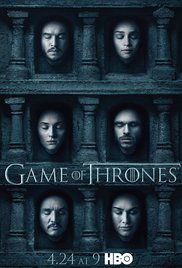 Johnny Cash once said he liked songs about love, God, and murder. Surely we can assume he would have been a Game of Thrones fan. Broaden love to include sex, murder to include all manner of horrific deaths, and add an “s” to the end of God and you’ve got the essence of the most popular TV show in recent memory. While Game of Thrones (from here known as GoT) is full to the brim with these things, that’s not really the focus of the stories it tells. Good luck trying to sum it up, though. It’s been tasked to me to provide a current ‘State of Thrones’ address, if you will, and let’s be honest, that’s much more than can be said in a single article.
Johnny Cash once said he liked songs about love, God, and murder. Surely we can assume he would have been a Game of Thrones fan. Broaden love to include sex, murder to include all manner of horrific deaths, and add an “s” to the end of God and you’ve got the essence of the most popular TV show in recent memory. While Game of Thrones (from here known as GoT) is full to the brim with these things, that’s not really the focus of the stories it tells. Good luck trying to sum it up, though. It’s been tasked to me to provide a current ‘State of Thrones’ address, if you will, and let’s be honest, that’s much more than can be said in a single article.
There is, however, a simple reason why it’s so difficult to summarize GoT. It’s because the story is about humanity. All of it. So you know, it’s pretty complex. The good news is, despite the very broad and deep examination into what makes us humans tick, we have a road map to help us draw out the central themes and follow the progression of the story. As with all maps, there are primary road markers, of which we have five for our journey. Their names are: Arya Stark, Jon Snow, Daenerys Targaryen, Tyrion Lannister, and believe it or not GoT diehards… Jaime Lannister.
Wait, you say. What about Sansa, Cersei, Bran, Sam Tarly, Theon, Littlefinger? All great characters, and we can certainly call them very interesting landmarks along the way. But if it can be said this story is about anyone, it’s about those five. So far, anyway. The road map is so wide open at this point that now even readers don’t know where we are going.
So here is a very brief guide for where we are now as we enter uncharted territory, and how our five road markers will allow us to understand what this very broad, fantasy-filled story is truly all about. Needless to say, spoilers for everything up through Season Five…
Figured I would start with the obvious. Season Five left Jon Snow in a pool of blood with a bunch of new holes poked into him. It sure looks grim for our hero who famously knows nothing. If you’re wondering if Jon is in fact dead, let me go ahead and answer that question for you: he’s dead. Not like, he appears dead, or it’s a dream or some kind of fantasy magic at work. Nope, he’s dead dead. And I say that not because of knowledge from the books (the most recent book ends the same way as last season). I say it because that’s what will make the story work.
Why is this important? Because his story isn’t over. Ah, there it is. The hope you’ve been holding onto since last season ripped your heart out. Why isn’t his story over if he’s dead? Truthfully, we don’t know what will physically happen to him. But the story of GoT is about the marginalized. “The cripples, bastards, and broken things,” as Tyrion once put it. Author George R. R. Martin has crafted a story full of mystifying magic, fire breathing dragons, mad kings, and vengeful queens… and laid the true power in the hands of the forsaken.
Jon Snow is the epitome of this, the shining jewel of the illegitimate. He was marginalized from birth, like so many characters in the GoT world, and in the eyes of those around him could never have actual power. Even when he is handed the power of men when he is appointed Lord Commander of the Night’s Watch, well, you saw how that turned out. Yet, he does have power. Just not the kind of power that kings and queens kill for. His power lies in his empathy and understanding that people are mortal and all lives are valuable. This is a supernatural power. It doesn’t seat men on thrones, but it is eternal. It has gotten him killed, but it’s the kind of power that triumphs over the grave.
Tyrion
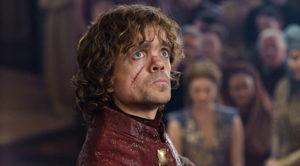 The reason Tyrion is so delectably enjoyable is partly because he’s such a clever wordsmith and unafraid to tell it like it is, but mostly because he too understands people. He just happens to be a lot more pessimistic about them than Jon Snow. You can’t really blame him, though. His dwarfed stature also marginalized him from birth, yet even he recognizes that if he wasn’t born with a physical deformity, he wouldn’t be the man he is now. Though, get a few cups of wine in him and he’ll probably easily trade it all for a societally normal life.
The reason Tyrion is so delectably enjoyable is partly because he’s such a clever wordsmith and unafraid to tell it like it is, but mostly because he too understands people. He just happens to be a lot more pessimistic about them than Jon Snow. You can’t really blame him, though. His dwarfed stature also marginalized him from birth, yet even he recognizes that if he wasn’t born with a physical deformity, he wouldn’t be the man he is now. Though, get a few cups of wine in him and he’ll probably easily trade it all for a societally normal life.
GoT attempts to prove that deformity is a dirty word. Just because most men are a certain build, with certain features shouldn’t mean those who look different should be considered less equal, or “deformed.” In one of the many parallels to Christian theology in GoT, the argument made is simply that they are “formed.” Tyrion’s power partly comes from his unique formation, but grows with his understanding that those who view him as unequal are the ones to be pitied.
Remember, this is a story where the true power belongs to those who are forced to understand what power really is. Tyrion is perhaps the most powerful of our five road mark characters because of his position and wisdom, yet he gets in his own way. All five of these characters do because they are human. It’s Tyrion’s bitterness that leads him to rail against his position. But that’s why we follow him. Because broken things can still be used to mend other broken things.
The only one of our five that actually possesses the power that men recognize and fear is our Khaleesi. Luckily, she too shows an empathy for mankind. Daenerys also is the only one of these characters that possesses a supernatural power. She is the mother of dragons and stepped into fire and out the other side unscathed. That’s an impressive power indeed, but as we’ve seen, even that isn’t enough to survive the games men play.
Daenerys was marginalized by her heritage. Bloodlines are of great importance in GoT. Innocents are often killed in this realm simply because of who they are related to. Daenerys would have been as well if not saved as a baby from that fate. It’s important that everything she has at this point she gained on her own. Equally important is her gender. Women could be the fourth noun following cripples, bastards, and broken things, for they are viewed this way in Westeros and abroad.
Khaleesi is a triumph of the GoT story. She heralds the type of world that could follow the current, brutal, and bloody climate of Westeros. She’s currently mired in a world of politics and tough decisions in Mereen and she may or may not end up the Westeros savior riding in on dragon’s wings to liberate the country of tyranny, but her part to play is certainly going to lead to the beginning of that. Nothing is so cookie cutter in GoT, but the closest hope we have to the dream fully realized is Daenerys ultimately sitting the Iron Throne. Though of course, winter is coming, and even those born of fire may fail to survive it.
Jaime Lannister
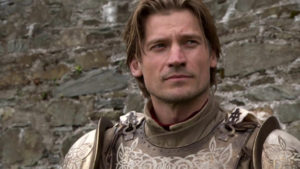 Now hold on a minute, Jaime is a villain, right? He pushed Bran out of a window and killed a king. Again, nothing is so black and white in GoT. The greatest scene in this show by miles was Jaime’s kingslayer confession to Brienne in the bath at Harrenhal. In that moment you saw a character shed his image of villainy and appear utterly vulnerable and human. Jaime is why GoT is so good. He has been marginalized only by his situation, by the role he has been forced to play (and yes, he played it well), but it makes his story so essential.
Now hold on a minute, Jaime is a villain, right? He pushed Bran out of a window and killed a king. Again, nothing is so black and white in GoT. The greatest scene in this show by miles was Jaime’s kingslayer confession to Brienne in the bath at Harrenhal. In that moment you saw a character shed his image of villainy and appear utterly vulnerable and human. Jaime is why GoT is so good. He has been marginalized only by his situation, by the role he has been forced to play (and yes, he played it well), but it makes his story so essential.
When we think of broken things, it’s so easy to see the poor, downcast, sick and lowly. And indeed that is a form of brokenness. But those in power can be just as broken. In fact, that’s why the GoT world (as well as our own) is so broken itself. Jaime proves that preconception is not necessarily one’s identity. Jaime carries a powerful empathy for the goodness in people, in large part because he’s seen so much of the evil. It is simply amazing, and quite hopeful, that for all the horror he has seen he still holds onto the fact that there is good. So many of our GoT characters have lost sight of that.
Jaime has been through hell and back (to King’s Landing) in our journey, and he’s the better for it. Unfortunately for him, good doesn’t serve one well in the belly of the beast that is the game of thrones. He’s at ground zero of treachery in King’s Landing and he now will have to choose to continue to believe in mankind’s goodness, or give himself back over to his villainous role. We left him with his own daughter dying in his arms. It’s going to be an awfully tough choice for him to make.
I saved perhaps the best for last. Arya Stark is about as close to the everyman as we get in GoT. She’s the picture of the weak versus the strong, the lone wolf (literally) against the world. In her we see that weakness is its own power, as it is simply her age and size that marginalize her. She has the bloodline, coming from one of the greatest houses in the land, and therefore has a strong claim to the power of men. Yet she’s lost, trying to find her path and her own way to survive in this world. We can surely all relate.
It seems like the Stark family is simply fodder for good plot lines, with the honorable Ned, his wife Catelyn, and his first born son Rob all killed off so far. Even his illegitimate son Jon is dead (sorry to pick the wound again). Don’t be fooled, though, the Stark family is of the utmost importance to our story. Sansa is going to be playing her own politics and may develop into more of a central focus, but up to and at this point it is Arya who represents the most legitimate realization of Ned Stark’s desire for justice and honor. It’s not going to come through the power of men and the bloodshed of war as he and his son Rob would have thought. No, it will come from the efforts of a little girl, easily overlooked and seemingly too weak to become anything but a meek wife in the eyes of her family. Arya will surprise us all in the end, have no fear.
But we see what happens when she tries to play with the power of men. She got a little full of herself and tried to take matters into her own hands and now she’s been blinded, on the other side of the world from Westeros in a weird temple that has dead faces in its basement. She’s got a long road ahead. Yet of our main five, she is the closest to true innocence that remains. That’s important, because while GoT will never allow innocence to remain, it is up to each character to learn the right lessons as it is taken from them, and Arya is an eager learner. She is hope amidst the brutality that goodness will triumph.
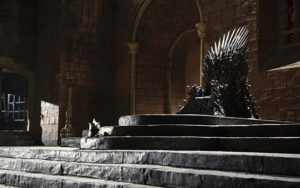 There is so so so much more we could cover but simply don’t have the time here. Sansa, Cersei, Brienne, Bran, and Sam are also essential characters to our story and may even become more important over the next seasons. They have their own lessons to tell and learn and certainly help to shed light on our central themes.
There is so so so much more we could cover but simply don’t have the time here. Sansa, Cersei, Brienne, Bran, and Sam are also essential characters to our story and may even become more important over the next seasons. They have their own lessons to tell and learn and certainly help to shed light on our central themes.
We also haven’t even touched on the fact that there’s a war coming between the power of man and a supernatural power we still know little about. Think there’s some theology at work there? You bet there is. But for now, here we leave it. The ‘State of Thrones’ looks to continue the incredibly entertaining ride into winter, and will surely teach us much more about how to survive it.


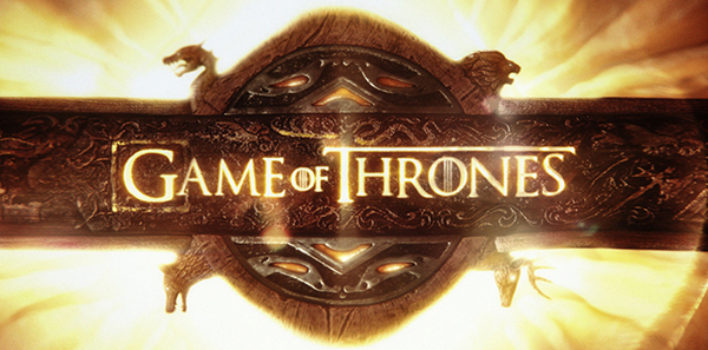
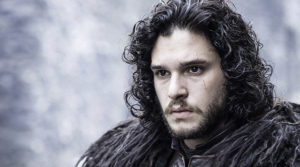
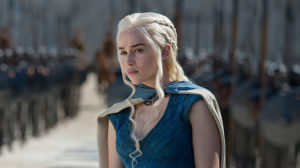
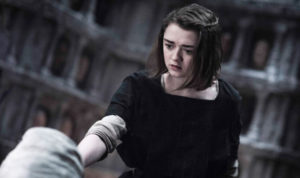


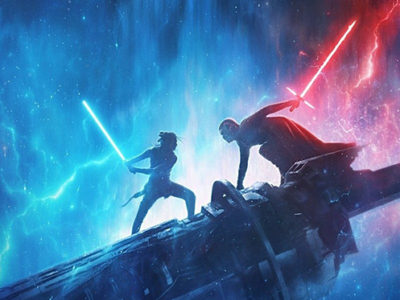


Pingback: GoT: S06E01 The Red Woman | Reel World Theology